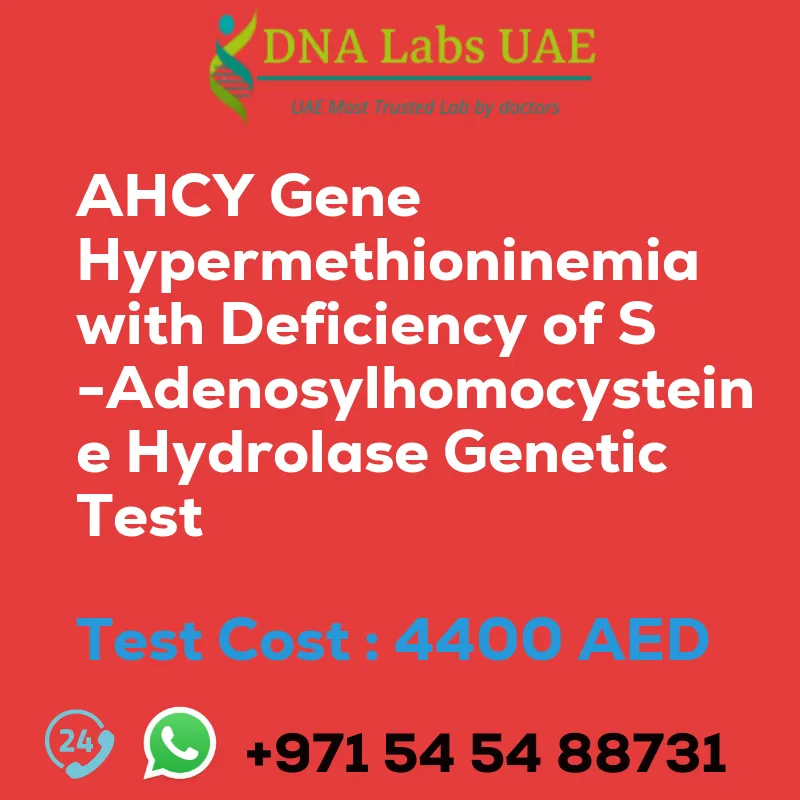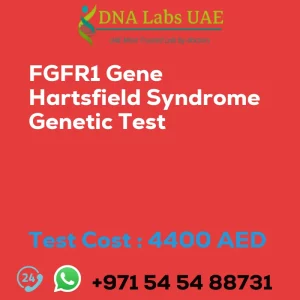AHCY Gene Hypermethioninemia with deficiency of S-adenosylhomocysteine hydrolase Genetic Test
At DNA Labs UAE, we offer the AHCY Gene Hypermethioninemia with deficiency of S-adenosylhomocysteine hydrolase Genetic Test for a cost of AED 4400.0. This test is used to diagnose individuals with elevated levels of methionine in the blood, a condition caused by mutations in the AHCY gene.
Test Details
The AHCY gene hypermethioninemia with deficiency of S-adenosylhomocysteine hydrolase is a genetic disorder characterized by elevated levels of methionine in the blood. This condition is caused by mutations in the AHCY gene, which produces the S-adenosylhomocysteine hydrolase enzyme. This enzyme is involved in methylation, a process important for various cellular functions, including gene expression regulation.
NGS genetic testing, or Next-Generation Sequencing genetic testing, is used to analyze multiple genes simultaneously. In the case of AHCY gene hypermethioninemia, NGS genetic testing can identify specific mutations in the AHCY gene responsible for the disorder. This information is valuable for genetic counseling, family planning, and developing targeted treatment approaches or management strategies.
Test Components and Price
Test Name: AHCY Gene Hypermethioninemia with deficiency of S-adenosylhomocysteine hydrolase Genetic Test
Components: NGS Technology
Price: AED 4400.0
Sample Condition
Blood
Report Delivery
3 to 4 Weeks
Test Type
Dysmorphology
Doctor
Pediatrics
Test Department
Genetics
Pre Test Information
Before undergoing the AHCY Gene Hypermethioninemia with deficiency of S-adenosylhomocysteine hydrolase NGS Genetic DNA Test, it is important to provide the clinical history of the patient. Additionally, a genetic counseling session may be conducted to draw a pedigree chart of family members affected by the AHCY Gene Hypermethioninemia with deficiency of S-adenosylhomocysteine hydrolase NGS Genetic DNA Test gene AHCY.
By obtaining this information, we can ensure accurate testing and provide comprehensive genetic counseling and support.
| Test Name | AHCY Gene Hypermethioninemia with deficiency of S-adenosylhomocysteine hydrolase Genetic Test |
|---|---|
| Components | |
| Price | 4400.0 AED |
| Sample Condition | Blood |
| Report Delivery | 3 to 4 Weeks |
| Method | NGS Technology |
| Test type | Dysmorphology |
| Doctor | Pediatrics |
| Test Department: | Genetics |
| Pre Test Information | Clinical History of Patient who is going for AHCY Gene Hypermethioninemia with deficiency of S-adenosylhomocysteine hydrolase NGS Genetic DNA Test. A Genetic Counselling session to draw a pedigree chart of family members affected with AHCY Gene Hypermethioninemia with deficiency of S-adenosylhomocysteine hydrolase NGS Genetic DNA Test gene AHCY |
| Test Details |
AHCY gene hypermethioninemia with deficiency of S-adenosylhomocysteine hydrolase is a genetic disorder characterized by elevated levels of methionine in the blood. This condition is caused by mutations in the AHCY gene, which provides instructions for producing an enzyme called S-adenosylhomocysteine hydrolase. The S-adenosylhomocysteine hydrolase enzyme is involved in a process called methylation, which is important for various cellular functions, including gene expression regulation. Mutations in the AHCY gene lead to a deficiency or impaired function of the enzyme, resulting in the accumulation of S-adenosylhomocysteine (SAH) and a decrease in the production of S-adenosylmethionine (SAM). NGS genetic testing, or Next-Generation Sequencing genetic testing, is a type of genetic test that uses advanced sequencing technology to analyze multiple genes simultaneously. In the case of AHCY gene hypermethioninemia, NGS genetic testing can be used to identify specific mutations in the AHCY gene that are responsible for the disorder. By identifying the specific genetic mutations, NGS genetic testing can help with the diagnosis of AHCY gene hypermethioninemia and provide valuable information for genetic counseling and family planning. It can also aid in the development of targeted treatment approaches or management strategies for individuals with this condition. |








